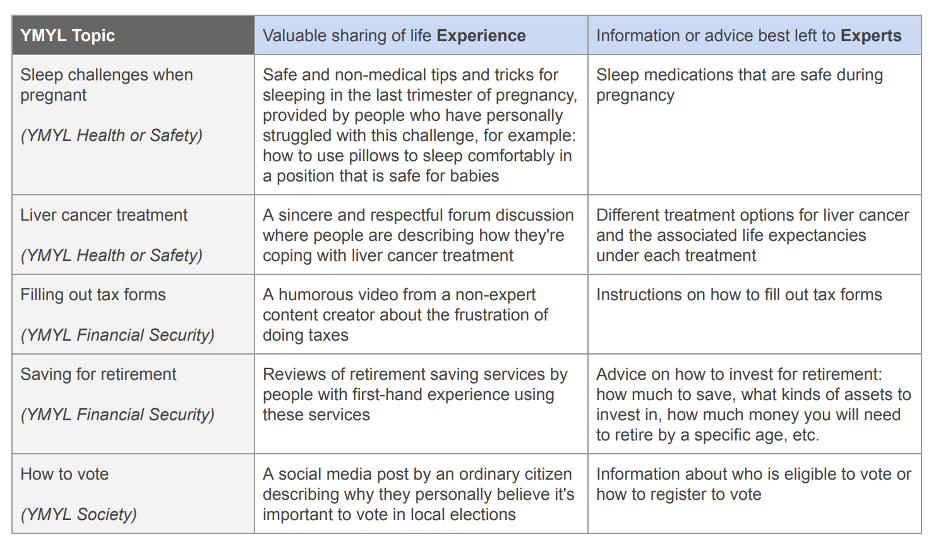
E-A-T (Expertise, Authority, Trustworthiness) is used by human quality raters to assess Google search ranking systems. However, in December 2022, Google expanded this concept to include a new criterion: ‘experience’. This created what is referred to as “Double-E-A-T”.
In other words, Google now requires firsthand experience for certain types of content to be considered trustworthy.
So if you’re producing content that requires experience—such as medical advice, financial guidance, or travel recommendations—you’ll have to prove that you’re an expert in that field and have first-hand knowledge.
What does this mean for search engine optimization (SEO)? It means that simply producing high-quality content isn’t enough to rank well in search results. Let’s delve into the specifics!
Is E-E-A-T a Ranking Signal?
Let’s clear up a common misconception: E-A-T guidelines do not have a direct impact on search rankings. However, they ARE used by Google’s search raters to evaluate how their search ranking systems perform.
The underlying philosophy behind E-A-T is to reward high-quality content that comes from trusted sources.
In other words, it’s not just the message that matters, but also the messenger. By prioritizing content from reliable sources, Google aims to provide users with the most accurate and helpful information.
So, while E-A-T may not directly affect your website’s ranking, it’s still a critical factor to consider for building a successful online presence. By establishing yourself as an authoritative and trustworthy source in your niche, you can attract more traffic and engagement from users, which can ultimately lead to better search rankings.
How Google Understands Experience
Within the concept of Double-E-A-T, experience simply refers to life or personal experience on any given topic. Simply put, if a website author has experienced what they write about firsthand, Google will reward them.
For example, if you’re writing a review of the latest iPhone, it’s not enough to simply read about its features and specifications. Google wants to see that you’ve actually used the product yourself, and can offer your own insights and opinions based on your personal experience.
Similarly, if you’re putting together a guide to the best restaurants in New York, you need to have visited them and dined there yourself.
Likewise, instead of blindly sharing a recipe for a cake, you should have made and tested it yourself. And those offering advice on how to help people cope with a particular illness need to have personal experience with the condition—or have helped others through it.
Experience vs. Other Criteria
Google values the ‘T’ in E-E-A-T, which stands for trustworthiness, as most important on any website. The other factors, such as expertise, authoritativeness, and experience, serve as pillars to establish trust.
Depending on the topic of the web page, certain additional criteria as well as experience may matter.
To assess what makes a content creator a trustworthy source, you have to first look at the page’s subject matter, type, and purpose.
For instance, a personal fashion blog doesn’t necessarily have to be written by a fashion expert to be considered trustworthy. On the other hand, a guide on DIY car repairs carries more credibility when it comes from a professional mechanic.
Keep in mind that you need to distinguish between experience and expertise. While expertise stems from skills, experience alone does not make one an expert. Furthermore, experience does not necessarily have to come from expertise.
What Kind of Topics Does the New “E” Concern?
Google’s initial concept of E-A-T applied to all topics. However, with the inclusion of experience, Google emphasizes the importance of firsthand knowledge by stating that “Experience is valuable for almost any topic” (QRG, p. 62).
Even for YMYL (Your Money or Your Life) topics, experience is crucial. However, expertise is not a prerequisite for establishing trust in these categories of topics.
That means, if experience plays a vital role in establishing credibility on a topic, the website author doesn’t have to be an expert.
On page 28 of the Search Quality Evaluator Guidelines, Google provides some practical examples:

How to Demonstrate Experience
To prove in your content that you have personal experience, use the following tips.
1. Show Evidence of Personal Experience With the Subject Matter
Consider the case of product reviews. In an attempt to curb the proliferation of affiliate websites featuring substandard product reviews, Google has released a document which advocates for reviews created by experts in the relevant field.
However, simply claiming to be an expert is not enough. You must also provide proof of firsthand experience with the product you review.
This proof can come in the form of visual or audio documentation, or other types of links to support your expert claim and validate the authenticity of the review.
To illustrate this point, we can look at Thomas Sanladerer, a well-known figure in the 3D printing industry, particularly in regards to product reviews. Thomas’s expertise stems from his extensive experience with the products he reviews.
Now, if Thomas were to stop providing hands-on reviews, his credibility as a source of product information would diminish due to his lack of personal experience with the product.
Therefore, it is crucial that Thomas continues to provide firsthand accounts of his experience with each 3D printer he reviews. The evidence he includes, such as the images he captures, serves as a powerful testimony to his expertise and strengthens the authenticity of his review.
2. Explain How You Created the Content
Your readers will appreciate you doing everything you can to show they can trust your reviews. Transparency is essential for this, so always communicate with your audience how you created a piece of content and how personal experience played a part in it.
For instance, Google recommends that publishers who use AI for content generation disclose their use of automation to their audience (Google doesn’t oppose the use of AI-generated content).
3. Demonstrate Your Experience on a Dedicated Page
It’s not necessary that you demonstrate your experience every single time you write about a subject. Also, Google uses quality raters to check how each website author portrays themselves.
Instead, use an ‘About’ page to explain your firsthand experience with what you’re writing about in addition to providing your social media account links as evidence.
4. Your Reputation Counts
Did you know that quality raters also check your level of expertise and experience outside your website?
In fact, the Quality Raters Guidelines recommend seeking out references, independent reviews, news articles, and other credible sources of information about a website or its creators.
For this reason, some websites include a table of contents just for press mentions. If you were to compare this to a brand new blog on the same topic that lacks any established reputation, which one would you consider to be more reliable?
Search engines can also use links to infer the level of experience and trustworthiness of a website. As Google confirmed, links and mentions were significant factors in the original E-A-T concept, and this is likely still true even with the introduction of experience.
5. If You Lack the Experience, Invite Someone Who Has It
If you don’t have personal experience with a subject you’d like to write about, simply invite an expert as a guest speaker or author to contribute to your page. This way, you still prove that the content you share is based on experience (just not yours).
It All Boils Down to One Thing: Trustworthiness
With the inclusion of experience in the E-A-T equation, creators who possess personal experience can now contribute to YMYL topics. However, it also sets a higher standard for topics where this type of experience is essential.
Regardless, Google’s main objective remains to provide helpful and relevant results by filtering out untrustworthy pages.
It’s important to note that there are other aspects of trust that aren’t necessarily captured by expertise, experience, or authoritativeness. Some examples include peer-reviewed publications for academic authors and customer service info for online stores.
Ranking systems are also designed to identify signals of trustworthiness beyond the E-E-A-T criteria. Therefore, it’s crucial to think of other ways to demonstrate trustworthiness.
This also serves as a warning for those who want to skirt the rules and manipulate the system: one sign that proves someone’s experience won’t cover up other signals of untrustworthiness.
Final Thoughts
The introduction of E-E-A-T by Google has resulted in an update to the content quality self-assessment guide, which can be a valuable resource for SEO experts and content creators to properly align their content.
With the addition of the new ‘E’, it’s even more evident that trustworthiness is the cornerstone of the E-E-A-T equation, and Google’s goal is to provide users with reliable search results every single time.
To achieve this, content creators must demonstrate expertise, authoritativeness, and personal experience while also considering other elements that contribute to establishing trust.
